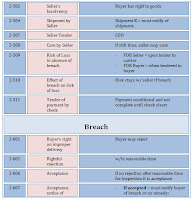The Uniform Commercial Code (UCC) is one of those subjects that most law students take early in law school. The subject matter tends to appeal to very few – unlike other classes like, say, Criminal Law, Con law, or Torts.
Why does the UCC exist when we have regular old “contract law?” Since 1952, the UCC has allowed the states to harmonize the law of sales and commercial transactions. Very rarely can a business exist by only conducting business within the confines of its’ own state. To put an end to the mass confusion created by the differences among varying state laws, the UCC (and all uniform legislation for that matter) exists to allow businesses to operate with more certainty and security.
Most of the rules are straightforward – some even the same or similar to principles learned in contracts. However, there a few big differences and several concepts not routinely taught in 1L contracts class.
Since UCC “Sales” is probably the most straightforward UCC subject (as opposed to Secured Transactions and Commercial Paper/Negotiable Instruments), it makes sense to learn it first. That’s why this is the first UCC special report available from Leap the Bar.
Here are a few of the visual aids and diagrams included in the UCC Sales Speed Review:
And a sneak peak at the main review chart:Here are a few of the visual aids and diagrams included in the UCC Sales Speed Review:















